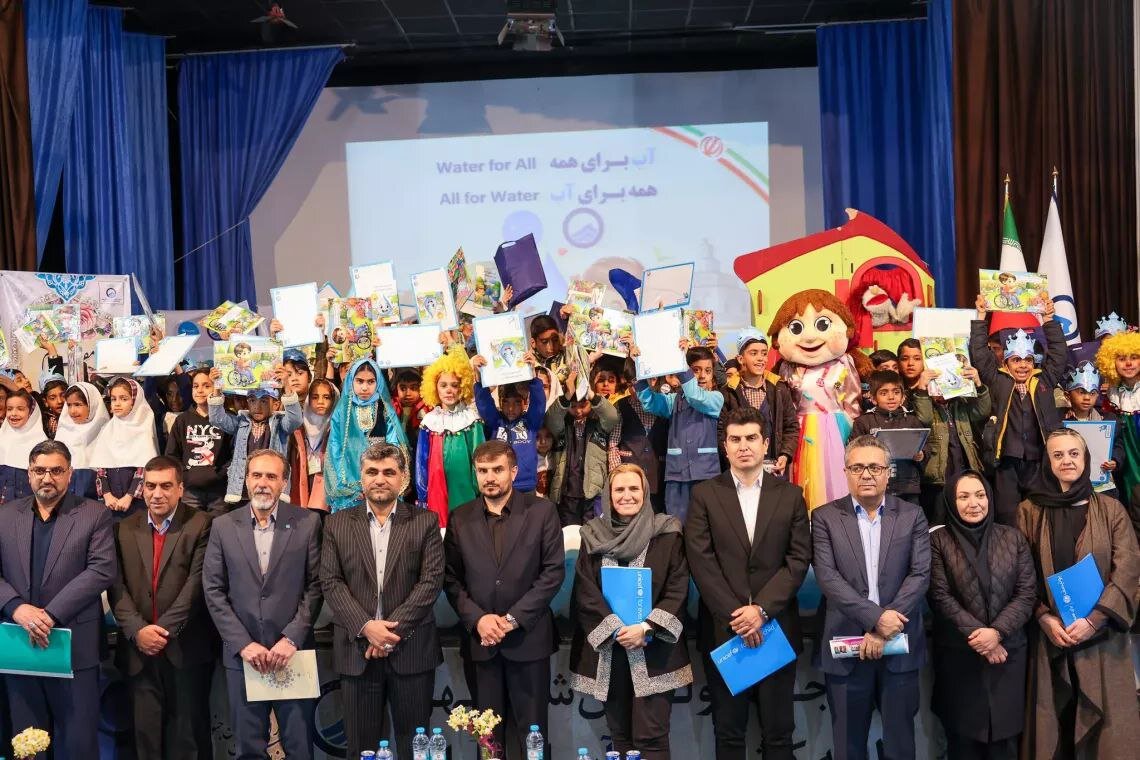Students in Birjand leading the way in water conservation

TEHRAN – Launching an educational campaign called “Water for all, all for Water”, the United Children’s Fund (UNICEF), in collaboration with the Ministry of Energy, as well as Water and Waste Water Company (WWC) has announced an initiative called “the Water Guardians” in Birjand, South Khorasan province.
This UNICEF-supported initiative builds on long-standing educational programs about water conservation, the UNICEF website announced in a press release on February 19.
The “Water Guardians” initiative aims to empower students to take an active role in water conservation. Through training sessions with WWC experts and educational materials, children learn how to advocate for responsible water use, both in school and at home.
UNICEF, through its WASH and Social and Behavior Change (SBC) programmes, supports—not just improving infrastructure such as upgrading water taps, drinking fountains, and restroom facilities in schools, but fostering a sense of responsibility among students about responsible water use.
The campaign reached 700 students across three primary schools, engaging them as active participants in water conservation through the ‘Water-Guardians’ initiative in December.
Water awareness celebration
More than 340 Iranian and Afghan students, all wearing colorful caps adorned with water drop symbols, held educational pamphlets about responsible water use. Around the hall, students’ artwork lined the walls, showcasing creative expressions of the importance of water. A lively water-themed song played in the background, setting the tone for an engaging event.
The celebration featured a variety of activities, students shared traditional stories about water conservation, animated characters highlighted the consequences of water waste, and winners of a water-themed painting competition were announced.
The event ended with a powerful call to action from school authorities, encouraging students to become agents of change in their families and communities.
Recognizing the potential of this initiative, school authorities and government officials expressed their commitment to expanding it.
“Students are the best ambassadors for water conservation. Their engagement will not only shape their behavior but also influence their families and communities,” said Mr. Asemani, the school principal.
UNICEF with the cooperation of the Ministry of Energy and WWC plans to support strengthening and expanding the ‘Water-Guardians’ initiative across more schools in 2025, empowering more student volunteers to promote water conservation.
The “Water for All, All for Water” campaign, reached 5,000 students, culminating in a closing ceremony in February 2025, with high-level participation from government officials, UNICEF representatives, and 400 students.
The event highlighted the role of children in water conservation, featuring an exhibition of student artwork, interactive activities, role-playing, and a call to scale up the initiative nationwide.
Improving water supply to South Khorasan
The Ministry of Energy, in cooperation with UNICEF, has enhanced water quality and ensured consistent access to water with adequate flow pressure for households by supporting the construction and rehabilitation of the water network in eastern Birjand’s villages.
Completed in December 2024, this initiative included the establishment of a new water distribution network in Dastgerd and Islamabad, connecting these villages to the main network in Darmian County, UNICEF website announced in a press release on January 20.
The project focused on rehabilitating and replacing outdated and non-functional infrastructure with high-quality materials, ensuring a sustainable water supply for the community.
These improvements have led to significant reductions in water loss from leaks, enhanced water quality, and ensured consistent access to water with adequate flow pressure for households.
Additionally, the intervention has drastically decreased the number of water-related incidents, leading to significantly lower maintenance costs. As a result of these significant enhancements, the consumers’ satisfaction has greatly improved.
This effort directly benefits 1,729 individuals including children, enhancing community resilience and preventing environmental migration. It also promotes financial development, reduces water loss, and mitigates the risk of waterborne diseases.
Given the success of this project in improving the water supply through decreasing water loss in the network, UNICEF, in collaboration with the Ministry of Energy, plans to launch a pilot programme in the province to compare the efficiency of this method versus other usual water supply methods. This pilot programme will compare the efficiency of reducing water loss versus the financial and environmental costs of water transfer from new and distant water resources, as a usual practice.
By tackling the critical issue of water scarcity, this project not only enhances the quality of life for residents but also fosters long-term sustainability in the region.
MT/MG
